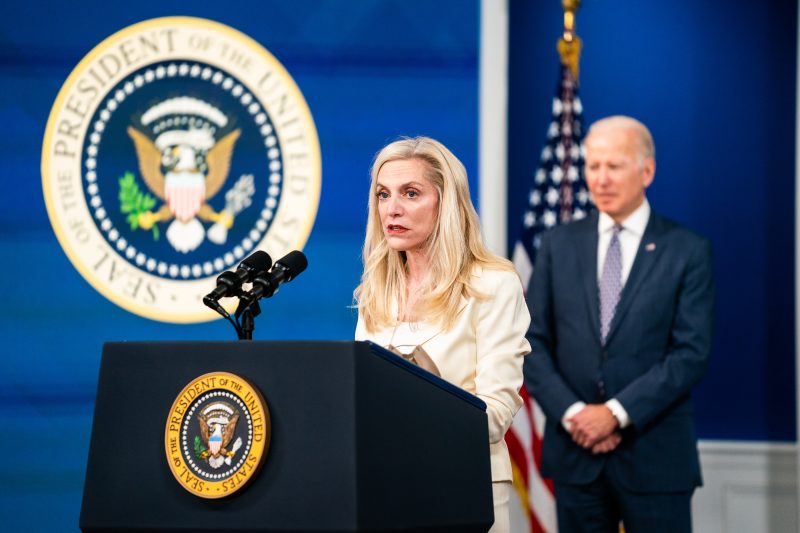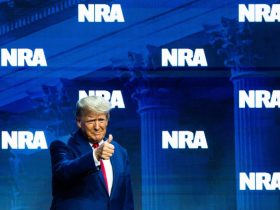President Biden is close to naming the next head of the National Economic Council, the top economic position in the White House, and Federal Reserve Vice Chair Lael Brainard has emerged as a top contender, according to three people familiar with the deliberations.
The choice of Brainard, 61, would be welcomed by liberals, given her support for strict regulation for Wall Street and her attention to the effects of climate change on the financial world. If selected, she would assume the influential position after the current NEC director, Brian Deese, leaves the White House, the people said, speaking on the condition of anonymity to discuss personnel matters.
Deese, who helped guide the White House through the turbulent recovery from the covid-driven economic downturn, is expected to leave soon, though he has not set an official departure date.
The White House declined to comment.
In addition to Brainard, Biden is also considering Commerce Secretary Gina Raimondo; Wally Adeyemo, the deputy treasury secretary; Gene Sperling, a senior adviser to Biden who ran the NEC under President Bill Clinton and President Barack Obama; Sylvia Burwell, the former secretary of Health and Human Services and current president of American University; and Bharat Ramamurti, the deputy NEC director.
People familiar with the process say Biden has not made a final decision and is still conducting interviews, but that Brainard has emerged as the front-runner.
Biden had previously considered Brainard, who is well-regarded in Democratic circles, to serve as Treasury secretary or to replace Jerome Powell as chairman of the Federal Reserve. When Biden instead decided last year to re-nominate Powell, he elevated Brainard to the number two role.
Brainard was the only Democrat on the Fed board throughout much of the Trump administration and was unusually influential. She stood apart as the central bank’s leading voice for stricter oversight of Wall Street. She consistently opposed policies that would have loosened the restrictions imposed after the Great Recession, and while votes by Fed board members are often unanimous, Brainard issued roughly 20 dissents on regulatory issues.
She has also focused on how climate change can pose a threat to economic activity, arguing that big banks’ exposure to climate-related risks could imperil the broader financial system. And she led the modernization of the Community Reinvestment Act, which was crafted to encourage banks to lend in low-income neighborhoods.
The next NEC director will face a range of decisions critical to Biden’s economic legacy, the most pressing of which may involve a potentially catastrophic standoff with congressional Republicans over the nation’s debt limit that, if not resolved, could throw the U.S. economy into a recession. The NEC is expected to lead those negotiations with GOP lawmakers.
Biden’s economic team will also face crucial questions on how to implement the Inflation Reduction Act and the infrastructure bill and will play a key role in handling economic policy on China as tensions rise with Beijing. The NEC is also currently working to set new national housing policies, push Biden’s antitrust agenda, and coordinate policy to prevent American energy prices from spiking amid the war in Ukraine.
While often aligned with progressives, Brainard is hardly a stranger to mainstream economics or politics. A Harvard-educated economist and former professor at the Massachusetts Institute of Technology, she has extensive experience across a range of federal institutions, holding senior roles at the Treasury Department, Fed and NEC.
Still, her selection would likely at least partially assuage growing fears among liberals that the president would bring on more conservative Democrats for senior positions ahead of the 2024 presidential election. The recently announced departure of White House chief of staff Ron Klain, who was widely viewed as close to the party’s liberal flank, has set off intense wrangling between factions of the Democratic Party over White House personnel.
Klain will be replaced by Jeff Zients, a former management consultant who spent most of his career in the private sector. Liberal advisers to the White House have made clear their opposition to selecting a Wall Street executive for NEC director, particularly given Zients’ new role, according to two people familiar with the matter, who spoke on the condition of anonymity to reflect private conversations.
“Zients could be okay, but if he results in a cascade of Wall Street personnel decisions in key posts, things could unravel really quickly for the progressives,” one of the outside advisers said, speaking on the condition of anonymity to discuss sensitive personnel issues.
If Biden selects Brainard, it could create new complications for the Biden administration, as it would open the number two role at the Fed. Brainard had been widely seen as closer to the “dove” faction on the central bank, wary of raising interest rates rapidly to fight inflation, and her departure would confront the White House with the need to find a replacement who could secure Senate confirmation.
In the fall of 2021, as Biden debated whom to announce as his Fed chief, some close to the White House and central bank argued that Brainard was more aligned with the White House’s agenda than Powell, who is a Republican.
Brainard recently delivered remarks focusing on the risks that come with the Fed’s all-out fight against inflation and its push in recent months to rapidly raise rates. She noted that the Fed’s mission is not only to stabilize prices but also to minimize unemployment.
“As we get further into restrictive territory, those risks around our dual mandate become more two-sided,” Brainard said Thursday. “Now we’re in an environment where we’re managing risks on both sides.”








